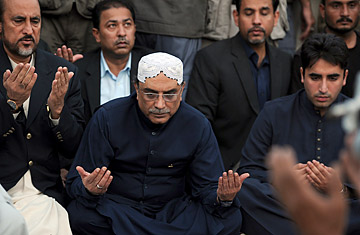
Pakistan's President Asif Ali Zardari (C) and his son Bilawal Bhutto (R) offer funeral prayers for the former first lady Begum Nusrat Bhutto, mother of assassinated former premier Benazir Bhutto during a funeral ceremony in Naudero in Larkana located in Sindh province on October 24, 2011.
Pakistan's President Asif Ali Zardari has been hospitalized in the United Arab Emirates after a suffering a "cardiovascular episode," politicians and aides close to him tell TIME. Zardari fell ill on Monday, they say, and was urged by his family and close aides to seek medical attention abroad in light of the stressful conditions he found himself at home amid a growing political crisis.
The full details of Zardari's medical condition, the politicians and aides say, will only become apparent after his physicians have carried out a full examination. "He had some illness which could be a complication of his heart condition and anxiety due to the extraordinary conditions in the country," one aide says. "Only doctors can tell what exactly it was."
Zardari's departure comes as his pro-U.S. civilian government is embattled on several fronts. It is still reeling from a scandal that saw Husain Haqqani, the ambassador to the U.S., accused of using a secret backchannel to ask the U.S. military to rein in its Pakistani counterparts in order to benefit the civilian government. Haqqani, who stoutly denies the charges, has been forced to quit and will face an inquiry. Political opponents keen to score political capital accuse Zardari of orchestrating the affair, a claim the government strenuously denies.
At the same time, Pakistan is locked in yet another crisis with the U.S. after NATO air strikes killed 24 Pakistani troops amid conflicting claims of what happened. To demonstrate it anger, Pakistan has choked off the NATO supply routes that run through the country, boycotted the Bonn security conference on Afghanistan's future, and ordered the CIA to evacuate an airbase in the southwestern Pakistani province of Baluchistan.
A senior politician from Zardari's ruling Pakistan People's Party (PPP) tells TIME that the Pakistani President was in a state of "high agitation" on Monday. "It was very upsetting to hear him like this," the politician says. "He was speaking in disjointed and disoriented terms. There was hysteria in his voice, and he sounded angry at the world." An aide confirmed that Zardari experienced the range of emotions described.
Another senior aide says that Zardari's inner sanctum had been urging him to seek medical attention abroad for a while but the president continually rebuffed those associates. Zardari, the aide says, kept insisting that he wanted to stay behind and confront the political challenges piling around him. Those close friends say they were worried there was something wrong with his medication and wanted him to receive expert medical care abroad.
Wajid Shamsul Hasan, Pakistan's high commissioner to the U.K. and a close friend of Zardari's, tells TIME that the Pakistani President suffered an angina attack in 2005. "Two of his arteries were blocked," Hasan says. "After an operation, stents were put in. Later, there was a complication with one of the stents and it had to be replaced in the United States." Zardari has suffered health problems since his over 11 years in prison, where he was held on corruption charges that were never proved. During his time in jail, members of his party allege, Zardari was attacked three times.
The aides say that Zardari was eventually persuaded to leave for Dubai at the intervention of his son and political heir, Bilawal Bhutto Zardari. The younger Zardari, the eldest son of slain former Prime Minister Benazir Bhutto, flew in from Dubai on Monday night, and prevailed on his father after a five hour meeting, according to the aides.
On Tuesday evening, Zardari boarded his Gulfstream jet, accompanied by close political aides and his medical team. A statement from the office of Prime Minister Yousaf Raza Gilani said that Zardari showed symptoms "related to his heart condition" and is being kept in Dubai for observation. Hasan, the envoy to the U.K., says Zardari might travel onward to London for further medical attention.
Zardari's departure sparked a frenzy of speculation in Pakistan after the president's spokesmen issued implausible statements saying that he had left for "prescheduled" and "routine" medical checks. During the day, the statement was slowly walked back as the local media seized on the news vacuum to speculate on Zardari's political future. On Tuesday night, there were even short-lived rumors of a military coup on social media sites.
Since assuming the office of the President of Pakistan, Zardari has made a series of regular visits to doctors abroad periodically. He had stopped smoking, though he would occasionally "light up" during moments of "high stress," one aide says. In person, he has usually appeared alert and, in more recent years, won a reputation for being a shrewd backroom dealmaker, forging unlikely coalitions and seeing his government through a series of crises that seemed to threaten it. In his absence, however, the growing mood of political uncertainty will harden.
